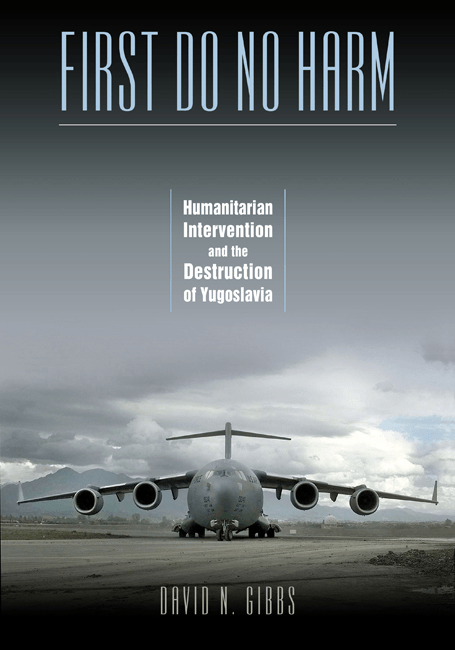 David Gibbs
David Gibbs
In the latest issue of Class, Race and Corporate Power, a scholarly and eclectically leftist open access journal launched by Ronald Cox in 2013, there is an article by David Gibbs titled How the Srebrenica Massacre Redefined US Foreign Policy that generated some interesting feedback from a wide range of scholars, including Kees van der Pijl. Gibbs responds to his interlocutors here.
When I first heard about these exchanges, I fully expected an angry attack from people such as Marko Atilla Hoare who wrongly accused Gibbs of being a genocide denier in an underhanded campaign that was the subject of a 2011 post on this blog. As it turns out, the commentary was civil and thoughtful even when it took a position at odds with the article.
In essence Gibbs argues that the killing of 8,000 Muslim residents of Srebrenica was certainly a war crime but not a genocide, an analysis I agree with. In general, I find Gibbs’s scholarship on the Balkan Wars to be informed, cogent and well-researched as I indicated in a 2009 review of his First Do No Harm: Humanitarian Intervention and the Destruction of Yugoslavia. Indeed at the time I was taking the Serb side to such a degree that some of Gibbs’s more critical statements about Milosevic got me hot under the collar. While I would not disown anything I wrote about the Balkan Wars, I certainly would be much more open to the arguments of the other side. Specifically, I had a tendency to demonize the Muslims because of the presence of foreign fighters. For me, fighting against the Russians in Afghanistan was prima facie evidence of being on the side of the Devil. But if there is anything I have learned from five years of writing about Syria, it is the need to avoid Islamophobic demagogy of the sort found in both electronic and print media from a cast of thousands.
Gibbs’s article is very much reading in its entirety but one passage really made me realize once again how the truth is the first casualty in war:
The idea that genocide was occurring seems to have originated with the issue of Serb-run detention centers in Bosnia, which housed Muslim and Croat prisoners, where major atrocities and abuses undoubtedly occurred. Beginning in 1992, the Bosnian government promoted the idea that these detention centers were Nazi-style extermination camps, similar to Auschwitz or Treblinka. New York’s Newsday helped publicize the idea of Serb extermination camps. In reality, the detention camp atrocities had been deliberately exaggerated by the Bosnian government, and President Izetbegović confessed this exaggeration shortly before his death, in a 2003 interview with former French official Bernard Kouchner. This confession was later reported in Kouchner’s memoirs:
Kouchner: You claimed the existence in Bosnia of “extermination camps.” You repeated this journalists… [Kouchner then notes he visited one of the main camps.] Conditions there were terrible but there was no systematic extermination. Did you know this?
Izetbegović: Yes, I thought the claims would help trigger a bombing campaign by the Western powers… I tried but my claims were false. There were no extermination camps in Bosnia, even though conditions were terrible. [emphasis added]
This exchange resonated with me especially since the anti-Baathist town of Madaya is now literally being starved into submission. Stephen Lendman, a supporter of the dictatorship in Damascus, writes that Syrian rebels are killing any of the townspeople trying to escape–a totally fabricated business not even cropping up on RT.com. While I would be the last person to describe what is happening in Syria as genocidal, I do know mass murder when I see it. I also know that things have reached a grievous state on the left when people speaking in its name can simply make things up to defend their support for the Syrian dictatorship that uses the same “anti-al Qaeda” rhetoric I used from time to time in the late 1990s.
With respect both to Lendman’s yellow journalism and Izetbegović’s cynical use of the big lie, the left has to draw a line over the need for journalistic integrity. It is a slippery slope from bending (or breaking) the truth and becoming a hired gun for any state pursuing a narrow path of self-aggrandizement as the sorry history of the USSR would indicate. When people like Lendman (and those with a much more elevated status such as Slavoj Zizek) can so easily write lies, we are in trouble.
Let me turn to some comments made by Jean Bricmont, the Belgian physicist who collaborated with Alan Sokal in a book that basically expands on the famous Sokal hoax. One of Bricmont’s other avocations besides trashing postmodernism is promoting the reputation of dictators who are regarded as enemies of the West, a stance that I was far too accommodating to in my pro-Serb phase. Bricmont complains that Gibbs cedes far too much to the other side of the debate, an error in his eyes that objectively suits the needs of the imperialist war-machine. He writes:
As Gibbs points out, the Srebrenica myth has been a standard pretext for justifying US attacks against one country after another. It was used against Serbia to detach the province of Kosovo, where a huge US military base was immediately installed. It was cited to justify the 2003 invasion of Iraq. It was used in Libya to kill the country’s leader and destroy the country. It is currently being used to justify efforts to overthrow the government of Syria.
The idea that the USA is trying to overthrow the government of Syria is widely accepted on the left, probably even by Ronald Cox and David Gibbs. However, the truth is that Obama never had George W. Bush “regime change” ambitions.
In fact there was zero interest in a large-scale intervention in Syria in either civilian or military quarters. All this is documented in a NY Times article from October 22nd 2013, written when the alarums over a looming war with Syria were at their loudest, that stated “from the beginning, Mr. Obama made it clear to his aides that he did not envision an American military intervention, even as public calls mounted that year for a no-fly zone to protect Syrian civilians from bombings.” The article stressed the role of White House Chief of Staff Dennis McDonough, who had frequently clashed with the hawkish Samantha Power. In contrast to Power and others with a more overtly “humanitarian intervention” perspective, McDonough “who had perhaps the closest ties to Mr. Obama, remained skeptical. He questioned how much it was in America’s interest to tamp down the violence in Syria.” In other words, the White House policy was and is allowing the Baathists and the rebels to exhaust each other in an endless war, just as was White House policy during the Iran-Iraq conflict.
In conclusion let me say a word or two about how I went through an attitude adjustment that led me to break with the “anti-imperialist” mindset of people like Jean Bricmont. During the war in Kosovo, I was contacted by a 1960s radical named Jared Israel who had been a leader of the Progressive Labor Party wing of SDS called the Worker Student Alliance. After years of inactivity, Israel had been stirred into partisan journalism on behalf of Milosevic. For obvious reasons, Israel saw me as a kindred spirit and sought my advice on how to spread the word.
I suggested that he start a website (these were the days before the blog had been invented) to promote his views. The fruit of that suggestion was something called the Emperor’s Clothes that had the same relationship to the Serb cause that CounterPunch or Global Research have to the Baathists today. What Jared Israel and people like Mike Whitney had in common was a visceral Islamophobia that was actually a counterpart to what Christopher Hitchens was writing in 2004 except on behalf of the Kremlin rather than the White House.
Not long after the war in Kosovo wound down, Jared Israel took up a new cause—the war on the Chechens who he regarded as a jihadist threat to the peace-loving and diversity-minded Russian people. When I heard this nonsense, I began to rethink my positions immediately since I regarded Putin as a malevolent figure dedicated to enriching himself and his cronies no matter who got in the way—Russian reporters or people living in Grozny being bombed into oblivion.
I felt vindicated in my course redirection when about a year later, Jared Israel’s Islamophobia went full-tilt boogie. He became an ardent Zionist and began writing for ultraright Israeli newspapers since it was obvious to him that the Muslims wanted to exterminate the Jews. To my knowledge, Jared Israel has since retired from political life—a benefit to himself and to the rest of humanity to say the least.




 Perelman uses nearly 6000 words to make the case that the U.S. and Britain “sabotaged” the work of the International Criminal Tribunal for the former Yugoslavia (ICTY) and allowed Serb criminals to go scot-free. It relies heavily on the word of one Florence Hartmann, a Serbophobe reporter for Le Monde in the early 1990s who became an assistant to Carla Le Ponte, the chief prosecutor of the ICTY. Hartmann is the author of one of those typically one-sided biographies of Slobodan Milosevic that makes him out to be Satan’s Spawn. Perelman’s article, however, relies heavily on her latest book titled “Paix et châtiment: Les guerres secrètes de la politique et de la justice internationales” (Peace and Punishment: The Secret Wars of Politics and International Justice) that is not yet available in English.
Perelman uses nearly 6000 words to make the case that the U.S. and Britain “sabotaged” the work of the International Criminal Tribunal for the former Yugoslavia (ICTY) and allowed Serb criminals to go scot-free. It relies heavily on the word of one Florence Hartmann, a Serbophobe reporter for Le Monde in the early 1990s who became an assistant to Carla Le Ponte, the chief prosecutor of the ICTY. Hartmann is the author of one of those typically one-sided biographies of Slobodan Milosevic that makes him out to be Satan’s Spawn. Perelman’s article, however, relies heavily on her latest book titled “Paix et châtiment: Les guerres secrètes de la politique et de la justice internationales” (Peace and Punishment: The Secret Wars of Politics and International Justice) that is not yet available in English.